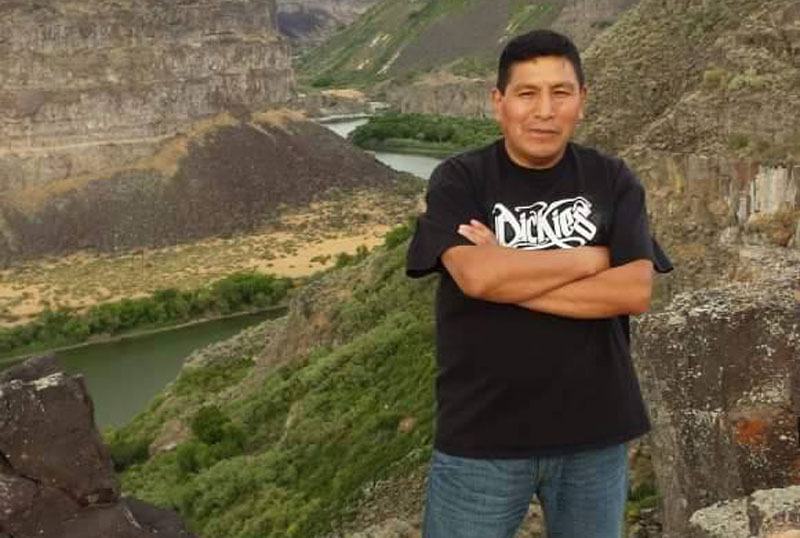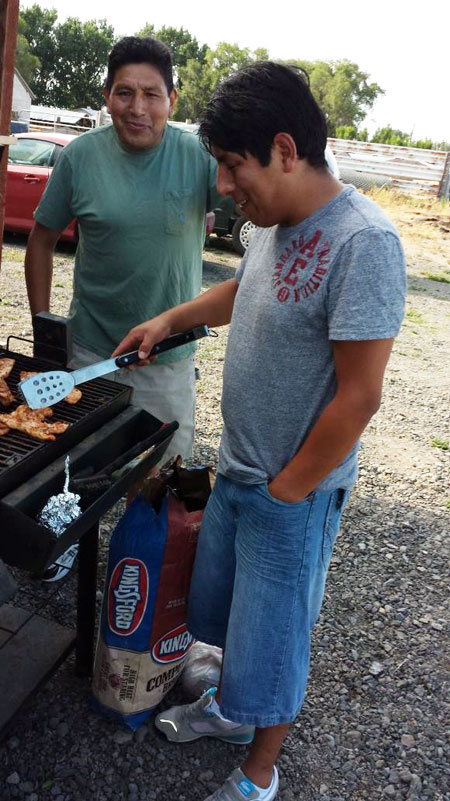Farm Confessional: How To Say “Cold” in Quechua
Meet a 23-year-old journalist and his Peruvian extended family.
Farm Confessional: How To Say “Cold” in Quechua
Meet a 23-year-old journalist and his Peruvian extended family.

Built like a barrel with arms and legs, Tomas bounced when he walked and worked with incessant joy. That day he moved perfectly in time with the mechanical thump. It seemed to remind him how fast he needed to move, and, like the machines, he never slowed down.
I did. That was the only time I milked an entire shift and it was exhausting. I usually watered pasture and fed calves, but I’m glad I did it. Tomas was one of five Peruvian men who worked on the dairy, and he showed me there could be joy in work.
So when I called home one day from college in Missoula, Montana, and my father told me the news, it stung more than I thought it would.
“Tomas is quitting and going home to Peru.”
It was a weird thing to process. Especially from 400 miles away. That’s because I knew Tomas. I knew his brother Alberto, his son Henry, and the Rojas brothers, Max and Wily.
I have friends who spent a lot of time around their aunts and uncles as kids. Mine live in California, so I saw them once or twice a decade. These five Peruvians, who ranged in age from their early 30s to their late 50s, were always around, and they gave me a different form of extended family. They weren’t at Christmas or around the Thanksgiving table, but they were everywhere else – at the grocery store, around town, in the stands at my basketball games, and, of course, on the dairy.
Wendell is in Gooding County, the land of gigantic dairies. I grew up on a small one. My father has about 400 cows – some neighbors count theirs by the thousands. I was the youngest of five kids by seven years. None of the others stuck around, so by the time I was 12, I was the only blood-related employee left.
I fed our calves most afternoons after school. I would come home, change into bleach-stained work clothes, and head to the barn. Max and Wily would be on tractors somewhere outside. Inside the barn would be one of the milkers.

For about 10 minutes, I would dip plastic bottles into buckets of milk and talk to whichever milker was there.
Alberto and I talked about sports (I won $2 from him on a bet on the 2001 World Series), and he always asked if I had a girlfriend (the answer was always no). Henry asked when my next basketball game was, even in the summer. Tomas filled the barn with a booming hello whenever he saw me, and, one cold winter day, he taught me a new language.
“It’s alalaw today!” he said, the last syllable rhyming with cow.
“What?”
“Alalaw! Means cold!”
The word comes from Quechua, a language native to Peru. All the guys knew it, to some extent. Primarily they spoke Spanish, but they occasionally mixed in some Quechua when talking to each other. Tomas was eager to teach me. Whenever I saw him that winter I said it was alalaw outside. He always agreed – until I told him it was alalaw on a hot summer day.
These five Peruvians were always around, and they gave me a different form of extended family.
“No no no,” he said. “Today is achachaw! Means hot.” My Quechua vocabulary doubled.
From then on, we always talked about the weather. He always grinned; a proud teacher. He took such joy in sharing that with me, and I am forever grateful that he did.
After high school, I was happy to leave but was also happy to come back and work on break. I needed money, and I got to see my Peruvian extended family. All five were always there. I took it for granted. I don’t anymore.
About a year before Tomas left, his wife was struck and killed by lightning in Peru. When it happened, he was getting ready for work, and, despite the tragedy, he worked anyway. I asked my dad about it a year later.
“It was incredible. He just carried on, you know, like Tomas,” he said. “Dum de dum de dum.”
Shortly after Tomas’ wife died, Alberto left, too. He had moved to a different town with his family about an hour’s drive away. The commute was too long, so he took a job hauling cows for someone else. His nephew Sandro replaced him and still works there, as do Henry and the Rojas brothers. I haven’t been back in more than a year, but I know who I’ll see when I return.
Tomas’ departure was hard to swallow, but it made sense. He hadn’t returned to Peru in years. He has another son and a grandchild there. It was time, I suppose. When I think of him now, I imagine him walking the streets, bouncing with every step, booming hellos to old friends, perhaps in Quechua. Never skipping a beat.
I called him before he left. His English was never very good, and language barriers are tougher on the phone. He thanked me, though I’m not really sure why. I was mostly calling to thank him.
Follow us

This work is licensed under a Creative Commons Attribution-NoDerivatives 4.0 International License.
Want to republish a Modern Farmer story?
We are happy for Modern Farmer stories to be shared, and encourage you to republish our articles for your audience. When doing so, we ask that you follow these guidelines:
Please credit us and our writers
For the author byline, please use “Author Name, Modern Farmer.” At the top of our stories, if on the web, please include this text and link: “This story was originally published by Modern Farmer.”
Please make sure to include a link back to either our home page or the article URL.
At the bottom of the story, please include the following text:
“Modern Farmer is a nonprofit initiative dedicated to raising awareness and catalyzing action at the intersection of food, agriculture, and society. Read more at <link>Modern Farmer</link>.”
Use our widget
We’d like to be able to track our stories, so we ask that if you republish our content, you do so using our widget (located on the left hand side of the article). The HTML code has a built-in tracker that tells us the data and domain where the story was published, as well as view counts.
Check the image requirements
It’s your responsibility to confirm you're licensed to republish images in our articles. Some images, such as those from commercial providers, don't allow their images to be republished without permission or payment. Copyright terms are generally listed in the image caption and attribution. You are welcome to omit our images or substitute with your own. Charts and interactive graphics follow the same rules.
Don’t change too much. Or, ask us first.
Articles must be republished in their entirety. It’s okay to change references to time (“today” to “yesterday”) or location (“Iowa City, IA” to “here”). But please keep everything else the same.
If you feel strongly that a more material edit needs to be made, get in touch with us at [email protected]. We’re happy to discuss it with the original author, but we must have prior approval for changes before publication.
Special cases
Extracts. You may run the first few lines or paragraphs of the article and then say: “Read the full article at Modern Farmer” with a link back to the original article.
Quotes. You may quote authors provided you include a link back to the article URL.
Translations. These require writer approval. To inquire about translation of a Modern Farmer article, contact us at [email protected]
Signed consent / copyright release forms. These are not required, provided you are following these guidelines.
Print. Articles can be republished in print under these same rules, with the exception that you do not need to include the links.
Tag us
When sharing the story on social media, please tag us using the following: - Twitter (@ModFarm) - Facebook (@ModernFarmerMedia) - Instagram (@modfarm)
Use our content respectfully
Modern Farmer is a nonprofit and as such we share our content for free and in good faith in order to reach new audiences. Respectfully,
No selling ads against our stories. It’s okay to put our stories on pages with ads.
Don’t republish our material wholesale, or automatically; you need to select stories to be republished individually.
You have no rights to sell, license, syndicate, or otherwise represent yourself as the authorized owner of our material to any third parties. This means that you cannot actively publish or submit our work for syndication to third party platforms or apps like Apple News or Google News. We understand that publishers cannot fully control when certain third parties automatically summarize or crawl content from publishers’ own sites.
Keep in touch
We want to hear from you if you love Modern Farmer content, have a collaboration idea, or anything else to share. As a nonprofit outlet, we work in service of our community and are always open to comments, feedback, and ideas. Contact us at [email protected].by Michael Wright, Modern Farmer
January 25, 2016
Modern Farmer Weekly
Solutions Hub
Innovations, ideas and inspiration. Actionable solutions for a resilient food system.
ExploreExplore other topics
Share With Us
We want to hear from Modern Farmer readers who have thoughtful commentary, actionable solutions, or helpful ideas to share.
SubmitNecessary cookies are absolutely essential for the website to function properly. This category only includes cookies that ensures basic functionalities and security features of the website. These cookies do not store any personal information.
Any cookies that may not be particularly necessary for the website to function and are used specifically to collect user personal data via analytics, ads, other embedded contents are termed as non-necessary cookies.